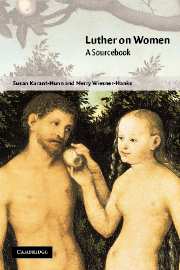2 - Eve and the nature of women
Published online by Cambridge University Press: 05 June 2012
Summary
In his formal treatises, Luther revealed the very significant extent to which he retained and transmitted the traditional view that women by their nature were inferior to men. Particularly Luther's several commentaries on the first three chapters of Genesis demonstrate not only the Reformer's opinion that through their participation in the Fall, women became subordinate to their husbands. Luther was convinced that from the moment of Creation, Eve was a lesser being than Adam. This was why, he explained, the devil first approached Eve; she was vulnerable to temptation. Compared to Adam, Eve had always been less rational and more emotional than Adam. Nevertheless, she was devoted to God and assisted Adam in carrying out the divine command that the pair and their progeny should subdue the earth and govern all other creatures. Before her seduction by Satan, she had had more leeway in her daily activities – could even be absent from Adam for a period in pursuit of her tasks. She was an excellent if a lesser being, like the moon in relation to Adam the sun; the moon, too, Luther said, was a most excellent body. This analogy, like that of woman as a house or a snail with her shell, is an ancient one and not original to either Luther or the Reformation.
Having succumbed to Satan, Eve's relation to her husband changed as part of the penalty imposed by God. Now she had to stay close to him and obey him in all things.
- Type
- Chapter
- Information
- Luther on WomenA Sourcebook, pp. 15 - 31Publisher: Cambridge University PressPrint publication year: 2003

